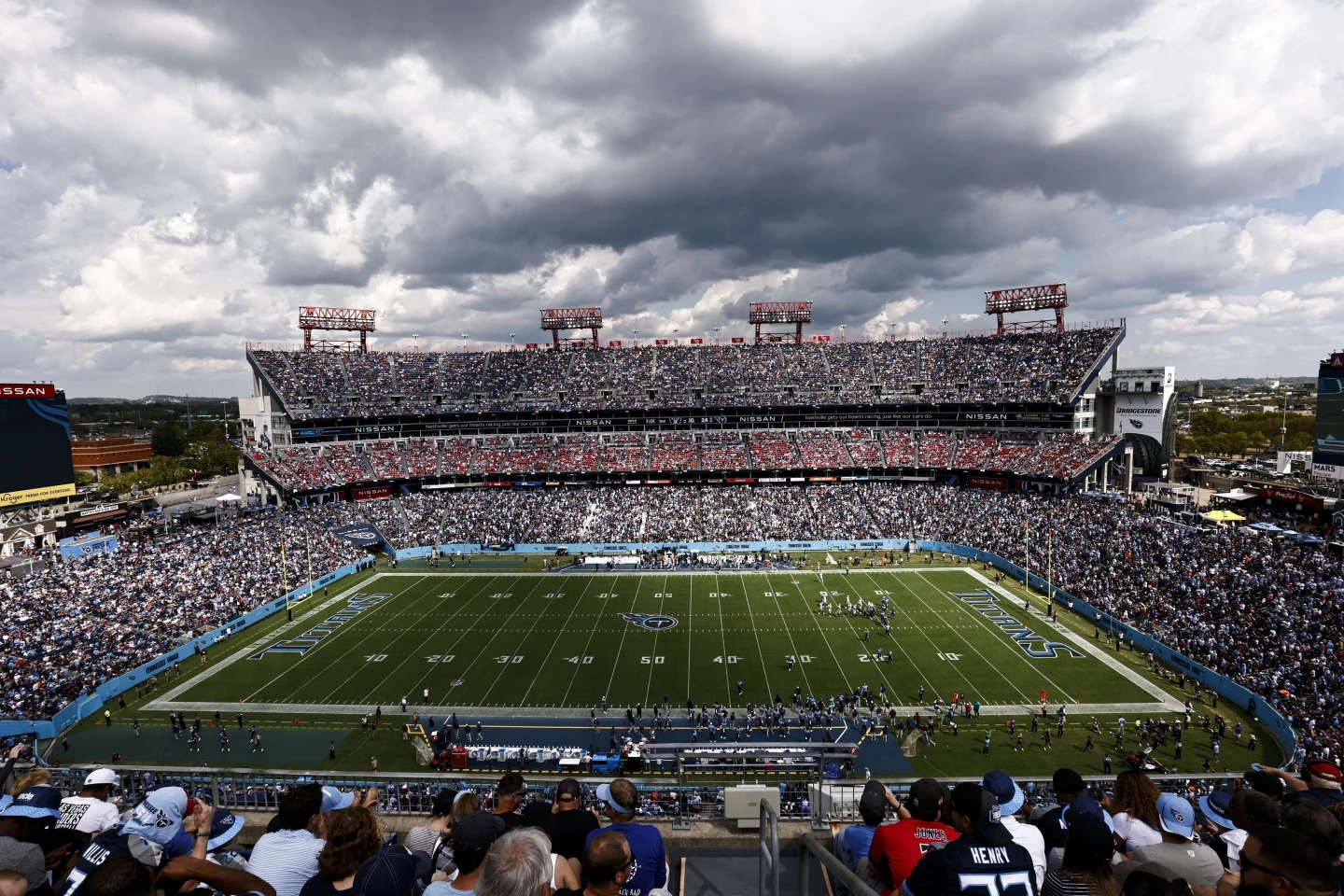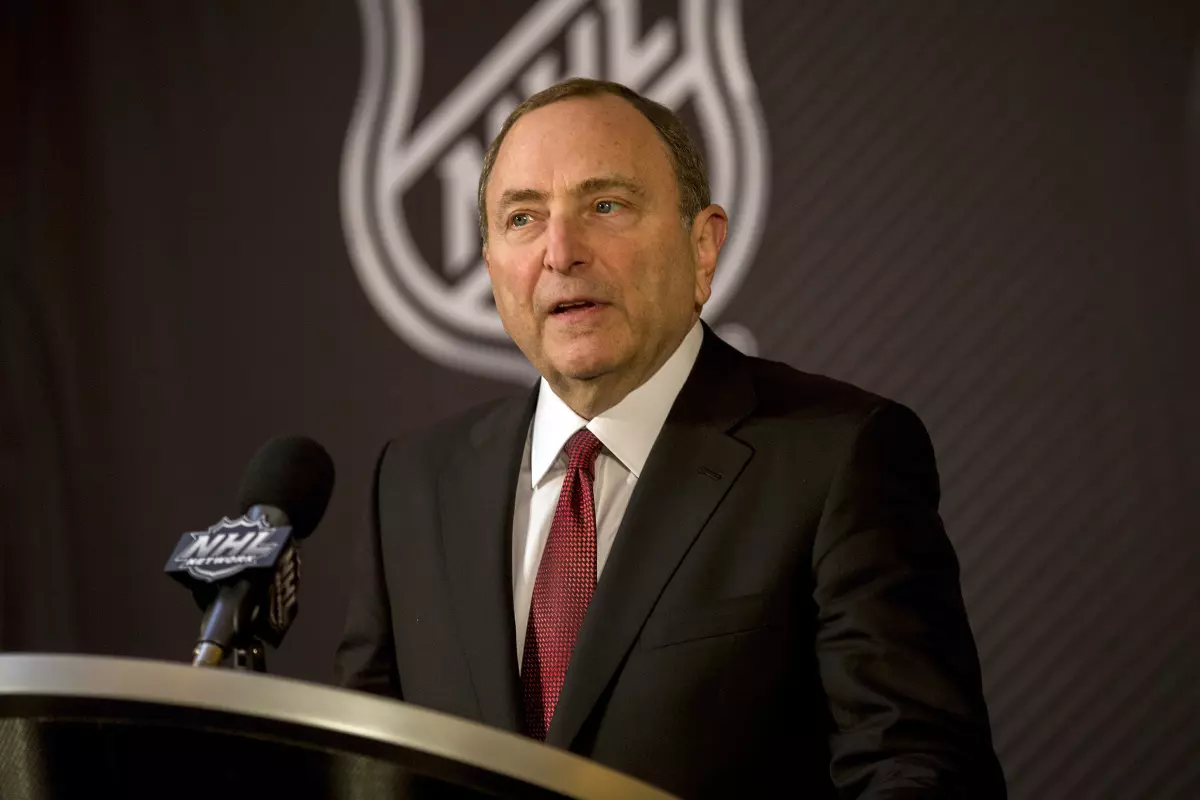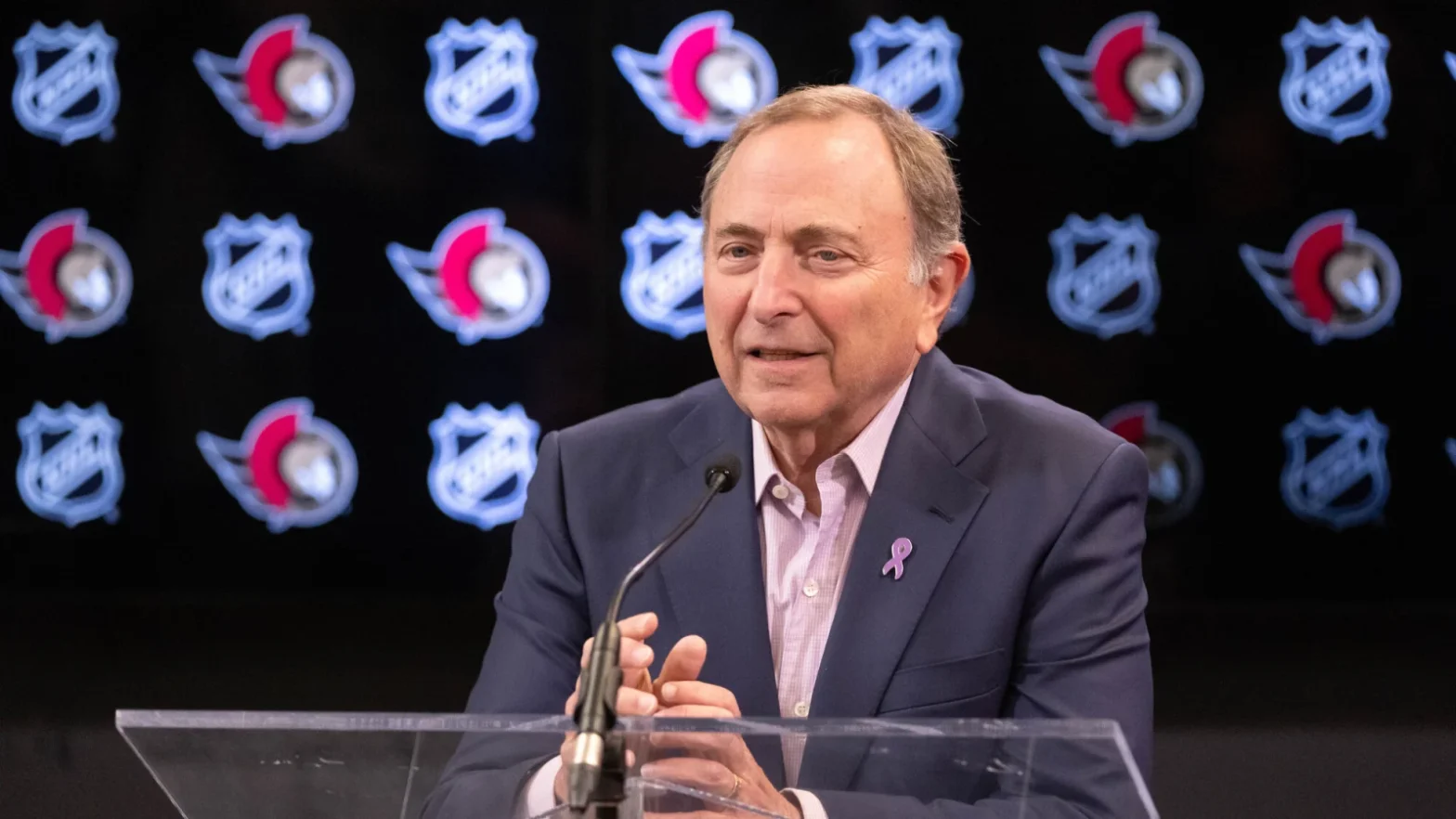The following excerpt is from The Franchise: The Business of Building Winning Teams by Craig Custance, Copyright 2024, published with permission from Simon & Schuster. All rights reserved. Available on October 15.
Brian MacLellan was strolling through the lobby of the Eau Palm Beach Resort, moving slowly due to his large build. Standing at six foot three with big hands, he’s a former Stanley Cup–winning NHL player turned lawyer, and later a Stanley Cup-winning general manager.
Originally from Guelph, Ontario, MacLellan’s path to the NHL was unique. He rose through the college hockey ranks under the famous coach Ron Mason, scoring thirty-four goals as a freshman at Bowling Green, a total that would have been the team’s highest if not for his close friend George McPhee, who scored forty.
MacLellan became the general manager of the Washington Capitals in 2014. He’s known to be reserved but has a good sense of humor. When we texted the day before to arrange our meeting, it was the first conversation we’d had in nearly three years. He responded with, “Where have you been hiding?”
I explained the situation and asked to meet up. Now, here he was, walking through the resort lobby, beneath the crystal chandeliers, heading toward the terrace with a view of the Atlantic Ocean. Large blue umbrellas provided shade for the guests lounging on blue-and-white striped chairs.
Other guests were relaxing in swimsuits, enjoying the mix of crashing waves and poolside music. The air smelled of sunscreen and the drinks people were having. We might have been the only ones wearing slacks and polo shirts, not working for the hotel.
I caught a break when MacLellan decided not to join his fellow general managers on the traditional Monday golf outing after the first day of the annual GM meetings in March. Instead, he was using the afternoon to recover from a demanding period at work. I asked how he was feeling.
“Frustrated with our year, a lot of injuries, a lot of stuff,” he said, sitting with his back to the pool and ocean. “It’s been constant.”
A few weeks earlier, Tarik El-Bashir reported in The Athletic that MacLellan had met with star Alex Ovechkin to update him on the Capitals’ plans for the trade deadline. Many key players, who had helped Ovechkin win his first Stanley Cup in 2018, were likely to be traded, including Ovechkin’s close friend Dmitry Orlov.

MacLellan informed the other general managers that the team was open to moving its veterans, marking the start of a selling phase. Orlov was the first to be traded. On February 23, the Capitals received three draft picks, including a first-rounder from the Bruins in exchange for Orlov. Five days later, Marcus Johansson was sent to the Minnesota Wild.
On the same day, MacLellan traded the Bruins pick for young defenseman Rasmus Sandin in a deal with the Maple Leafs. The final move was trading Lars Eller to the Colorado Avalanche for another pick.
These transactions signaled the dismantling of a former Cup-winning team.
It was Eller who scored the goal in the 2018 Stanley Cup Final against the Vegas Golden Knights, digging a puck out from behind Marc-André Fleury and putting it in the net with 7:37 left in the third period. This goal sent Washington, D.C., into chaos and clinched the Cup. But inside the organization, people say that wasn’t even the most important goal Eller scored during that playoff run.
No game was more important during the Capitals’ path to the Stanley Cup than Game 3 of their first-round series against the Columbus Blue Jackets. The Capitals had lost the first two games at home and were on the verge of losing the third game in Columbus.
With the score tied at two and only 1:16 left in regulation, Columbus star Artemi Panarin took a pass from Zach Werenski and fired a shot that hit the left post, the sound echoing up to the press box. In overtime, Cam Atkinson also hit the post. The Blue Jackets were determined to push the Capitals into a three-game deficit, which could have dramatically changed the future of the franchise.
But with eleven minutes left in the second overtime, Brett Connolly fired a shot that Sergei Bobrovsky blocked, and the rebound bounced to his left. Zach Werenski tried to clear the puck, but Lars Eller blocked it, and after a few deflections, the puck found its way into the net.
Just like that, the game ended, and the Capitals were back in the series. If any of those shots from the Blue Jackets had gone in, the franchise’s history could have been completely different. It’s important to remember just how much luck is involved in winning a hockey championship.
“We talk about it all the time. All the time. Game 3 of the first round, we’re about to go down three-oh to the Blue Jackets, and who knows what happens after that if we get swept in the first round,” said Zach Leonsis, son of owner Ted Leonsis and president of media and new enterprises with Monumental Sports.
“Lars Eller comes back and scores the overtime winner and then we win every game after that [in the series] and we go on to win the Stanley Cup. It was inches away.”
Inches. So yes, trading Lars Eller was painful. Trading all of those players hurt.
“It wasn’t easy,” MacLellan said. “Plus, you get everyone to hate you, you know?”
This is the part of being a general manager that people don’t always see. The Capitals’ coaching staff was upset with MacLellan. They didn’t care about the chances of winning the playoffs at that point; they were still trying to win games.
Players were upset too. Ovechkin’s close friend was gone. The guy who scored a goal that changed the franchise and brought the team together was gone as well. These weren’t just trades; they were legacies leaving.
“You’re ripping guys out of the room that you’ve won a Cup with,” MacLellan said. “It rips the f—ing heart out of the players, you know? They’re like, ‘What the f— is going on?’ They don’t care about the future, retooling. ‘Don’t give me any of that f—ing crap, it’s my buddy you just got rid of.’ … You’re calling guys and they’re saying goodbye to everybody at practice.”
The pain was still fresh. While winning with these players, MacLellan had come to know their families. He knew their kids. MacLellan understands that there is a barrier between players and management, but that barrier isn’t impenetrable.
If you become too distant, you lose your humanity. MacLellan still held onto that humanity. In that moment at the Florida resort, it was clear the job was taking its toll on him. Building a Stanley Cup winner is far more enjoyable than tearing one down, even if you try to frame it as a “retool” or something less difficult.
I shared my idea that perhaps it should be a different general manager overseeing the rebuild rather than the one who won the Stanley Cup. He didn’t disagree.
“You need new energy, you know?” he said. “I’m at a certain age where I’m going to be winding down here, too. I think my skills were good for the stage we were at over the last ten years.
It’s probably better for someone fresh to come in at some point here. We’ve got to get through the next three years, see how we can do, and then it’s new [when] Ovi’s gone, all these guys are gone. The transition has to happen then, to a new guy. I think.”
It wasn’t an easy moment for the person who helped build the first Stanley Cup-winning team in Capitals history. But that wasn’t the reason I wanted to talk.

One of the things that makes the hockey community admirable is how willing those who have succeeded are to help those still finding their way. It shows up in different ways. Sometimes it’s an NHL coach leading a penalty kill seminar for youth coaches during the summer.
Or Gordie Howe giving advice to a young Wayne Gretzky on what it means to be an ambassador for the sport. Or Cammi Granato showing up at a Nike camp to offer advice to women growing up admiring her on winning Olympic gold.
Maybe it happens in other sports, but it definitely does in hockey. So, when Kyle Dubas reached out to Brian MacLellan to learn how to handle crushing playoff disappointments, there was no hesitation to share everything he had learned. If anyone knew about playoff disappointment and the criticism that follows, it was MacLellan and his Capitals.
In 2017, the Capitals suffered a Game 7 loss to the Pittsburgh Penguins, leading to one of the most crushing postgame scenes I’d ever seen. It was the third consecutive second-round exit for a team that should have been a powerhouse.
The media moved from player to player, looking for answers, even though there weren’t any. T.J. Oshie, drenched in sweat, struggled to find the right words.
“You almost wonder how much disappointment you have to put yourself through before you can find a way to get the job done,” Oshie said that night.
At that moment, I honestly thought we were seeing the end of the Capitals as we knew them. Later, I would find out that some players on that roster felt strongly that big changes were needed. MacLellan was the one tasked with fixing years of underachieving by a talented team, and Dubas reached out to learn about the decisions that followed.
“I went through our experience,” MacLellan said. “The story is the same, and we had the same type of teams where we had skilled teams. Really good during the season.”
And then?
“Underperforming.”
Even though winning a championship and some time had helped bury the frustrations from those underachieving teams, some of the emotions started to come back as MacLellan thought about that time of helping lead the Capitals.
Three years in a row, the team’s playoff run was ended by the New York Rangers. After that, the Pittsburgh Penguins ended their postseason hopes in consecutive years. A team full of talent couldn’t make it past the second round.
“It’s like, ‘Pittsburgh again? Right away?’” MacLellan said. “You make the argument we were the two best teams in the league. But you still got to get through it, you know?”
Similar to Dubas after the Leafs lost to the Canadiens in 2021, MacLellan led the Capitals through honest exit interviews after their Game 7 loss to the Penguins in 2017. He asked questions to get feedback and gave players a chance to express their frustrations. He allowed them to get their anger out and talk about what they felt needed to change.
Veteran defenseman Brooks Orpik was the first one to speak.
“It went by age,” Orpik said when we discussed those conversations.
In May of 2014, the Washington Capitals promoted MacLellan from assistant GM under McPhee to replace McPhee as GM. One of his first major moves was signing Orpik to a five-year deal worth $27.5 million, a contract that wasn’t widely praised. When the deal was signed, a CBS Sports writer wrote, “At that price, this deal is already looking like a bad one for the Capitals.”
Critics thought Orpik wasn’t a good skater and was getting older. But for MacLellan, this move was about changing the culture of a team that needed to figure out how to win. When Orpik arrived, he knew the last thing his teammates wanted was for him to come in and tell them how things were done in Pittsburgh.
He wasn’t going to share a bunch of Sidney Crosby leadership stories. But the Capitals players were curious. What made it work in Pittsburgh? How was Crosby as a leader?
The one thing Orpik focused on was practice habits.
“Sid is a guy who doesn’t say a ton, but he is the hardest-working guy every single day in practice,” he said. “With his stature, it forces everybody else to follow.”

Working closely with coach Barry Trotz, Orpik tried to share some of the feedback he had and help improve the team’s work ethic, pushing them to do more than they had been doing in the past. There was a point when the team got off to a slow start in the season, and both of them realized that some work needed to be done.
“I remember saying, ‘Hey, there’s just so many things that have been done a certain way for so long, it’s going to be tough to weed out some of these bad habits and cultural issues here that might be hurting some of the success,’” Orpik said.
By the time the 2017 playoffs came around, those issues had been fixed. The players felt like they were in the best position to win, and that’s what made losing to the Penguins so tough. For the player exit interviews, each player was scheduled for ten minutes with MacLellan. When Orpik finished his conversation, he walked out into the hallway and saw that at least five or six players were waiting.
His conversation had lasted over an hour.
“Mac was really digging and probing,” Orpik said. “I really want to win. I want to help Mac out because I want to win. But you’re also not throwing anyone under the bus here. You’re kind of caught. It’s a tough wire you’re walking on there.”
“It was exhausting,” MacLellan said.
When I asked Orpik for more details about the conversations, he stopped. “How honest was Mac?”
MacLellan is known for being honest. He gives direct answers and is also direct when he doesn’t want to share something. In this case, he did both. According to MacLellan, two very clear solutions came from the players during those exit interviews. If he was going to follow the advice from the team, there were two strong recommendations.
What were the two things?
“I’m not telling you,” MacLellan answered. “It affects people. It’s just a private thing. I’d be breaking a big trust thing because everybody opened up, one hundred percent.”
Not only wasn’t he sharing the two things, but you also can’t go back and look at any moves or transactions MacLellan made that summer for hints. The management heard the players’ recommendations, but they didn’t act on them.
“We chose to fight through those issues the next season,” MacLellan said, “which could have been a disaster.”
Orpik wasn’t giving it up, either.
“I know what the two things were, kind of the collective response, and they did neither,” he said before questioning how management ignored the two suggestions.
“Looking back even more, gathering all that information, how did they not pull the trigger on one of those things?”
Dick Patrick, who has been with the organization since 1982 and is the chairman, helped explain. His grandfather, Lester Patrick, won two Stanley Cups as a player with the Montreal Wanderers in 1905 and 1906 before coaching and managing the New York Rangers. His father, Muzz, also won a Stanley Cup with the Rangers in 1940.
“Growing up as a boy, going with my dad to Rangers games, [I learned] the players are such good people, straightforward people. You can’t be dishonest on the ice and be successful,” Patrick said.

He explained that the most successful teams have that honesty and respect for everyone, from the top player to the last person on the roster to the team services staff.
“A team doesn’t win just because of one or two stars or the smartest coaching,” he said. “It wins from having great effort and support and performance from everyone.”
But Patrick also said there are limits to this honesty. Emotions can cloud judgment. When asking for opinions after an emotionally exhausting series, the answers might not always be logical.
“First of all, players work so hard and put their everything into it every year. When you don’t win, those exit interviews, they’re not going to be happy. They’re going to be very candid. Oftentimes it’s ‘This teammate has to go,’” Patrick said. “They work so hard at it. Everything is there to win.
They never expect to lose when they’re in a playoff series. When they do, they feel something went terribly wrong. What is it?”
In this case, the players pointed in two directions, but management didn’t act on them. The following season, the Capitals finally broke through and won the Stanley Cup, passing the first round by just a small margin. That’s how risky each decision can be when running an NHL team.
“So I told Kyle that,” MacLellan said. “Trust your instincts, do what you think needs to be done and not what the perception is. And if it’s this serious, like our issues — you assume he has [similar but] different things — I said, ‘You make the choice and live with it.’ … It’s not what everybody else thinks.
The players aren’t always correct and the coaches aren’t always correct and the fans definitely aren’t always correct in their assessment. The media, the fans, the whole thing.”
MacLellan’s conclusion?
“He has to make his decisions.”
The trip to Florida didn’t provide all the answers I was looking for. But it did open up new paths because it was clear there was a lot to learn from the Capitals and the challenges they faced before winning a championship.
Going through different coaches. Moving on from George McPhee, who built the foundation of the Stanley Cup-winning team before getting fired. Replacing him with his close friend.
There were many interesting decisions made along the way in Washington, D.C., and the best place to get clarity was at the very top of the organization.
